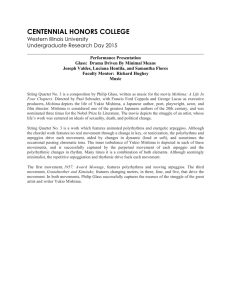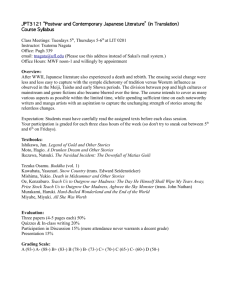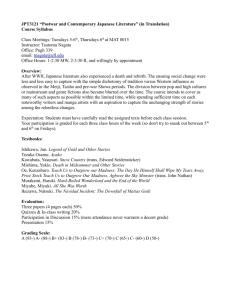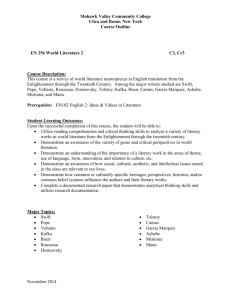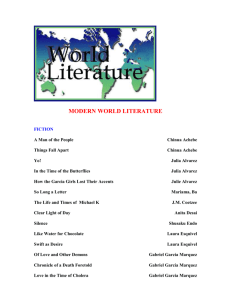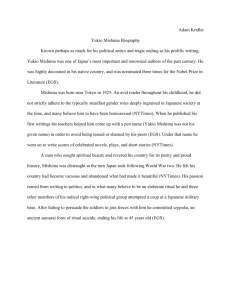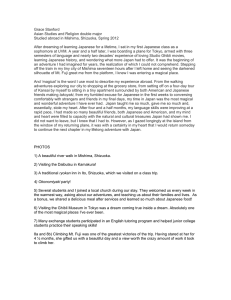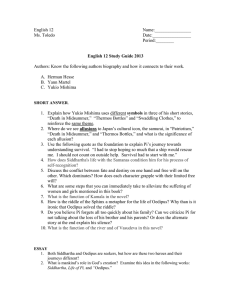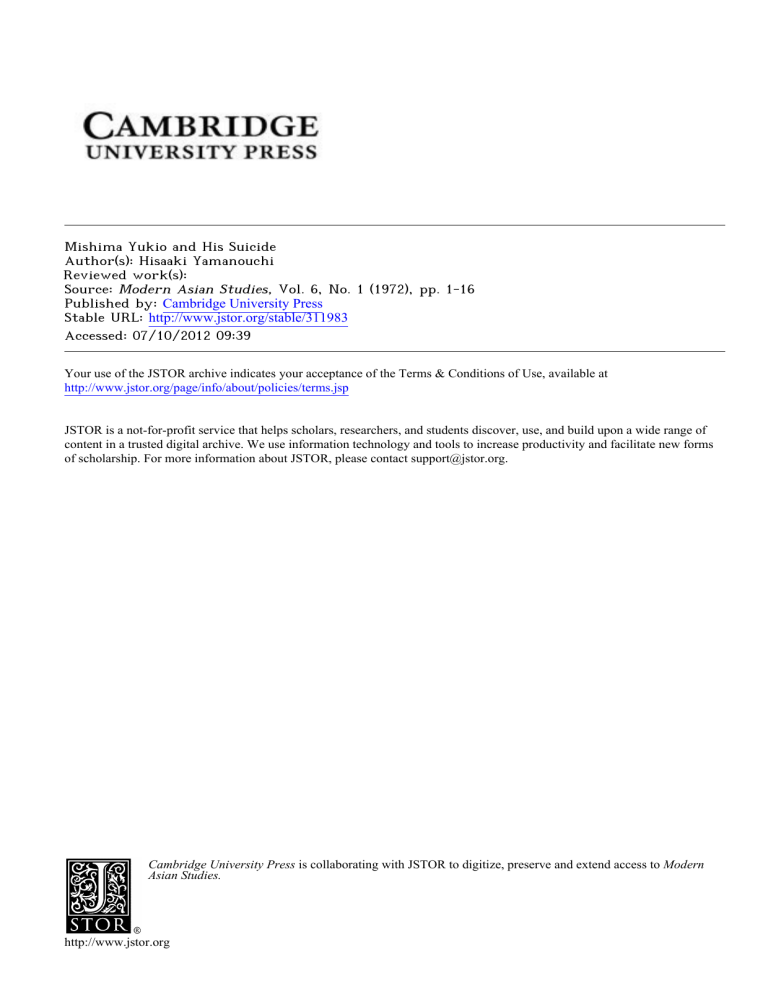
Mishima Yukio and His Suicide Author(s): Hisaaki Yamanouchi Reviewed work(s): Source: Modern Asian Studies, Vol. 6, No. 1 (1972), pp. 1-16 Published by: Cambridge University Press Stable URL: http://www.jstor.org/stable/311983 . Accessed: 07/10/2012 09:39 Your use of the JSTOR archive indicates your acceptance of the Terms & Conditions of Use, available at . http://www.jstor.org/page/info/about/policies/terms.jsp . JSTOR is a not-for-profit service that helps scholars, researchers, and students discover, use, and build upon a wide range of content in a trusted digital archive. We use information technology and tools to increase productivity and facilitate new forms of scholarship. For more information about JSTOR, please contact support@jstor.org. . Cambridge University Press is collaborating with JSTOR to digitize, preserve and extend access to Modern Asian Studies. http://www.jstor.org 6, I AsisnStudies7 Modern (I972), pp. I-I6. Printedin GreatBritain. andhisSuicide Yulxio Mishima HISAAKI YAMANOUCHI of Cambridge University YUKIOkilled himselfon 25 NovemberI970 at the age of MISHIMA forty-fivein the traditionalJapanesewarriormannerof septakuafter a vain attemptto incite a unit of the Self-DefenceForcesto a coup d'etat. The eventshockedand alarmednot only the Japanesebut also by young army peopleabroad.Manywereremindedof the I936 COUP officers,and some,especiallyabroad,becameworriedabouta possible revival of Japanesemilitarism.But the jeering by the rank and file troops whom Mishima tried to rouse to action proves that such a possibilityis very slight. The Japanese Government,including Mr Nakasone,the Ministerof Defence,positivelydisapprovedof Mishima's action. The Prime Minister Mr Sato, was anxious lest such scandalousbehaviouron the part of an eminentwritermight tarnish the reputationof the countryfoundedon economicprosperity.Nevertheless,nothingseemsfartherfromthe truththan the PrimeMinister's statementthat Mishimahad 'gone mad'. In every detail Mishima's suicidewas an act calculatedwell in advance.In its politicalimplicationsit wasa challengeto the kindof stabilityandprosperityof presentday Japan of which the Prime Ministerhimselfis the representative. intellectuals,but or left-wingJapanese Mishimadetestedthe progressive he did not alignhimselfwlth the LiberalDemocraticPartyeither.Nor was he preparedat all to link with the right-wingorganizations)in spite of the ultra-nationalismof his own Shield Society. Ironically enough,Mishimacould have agreedwith the dissidentstudentsof the New Left who played the leading role in the I968-69 universityupheavals.For despitetheir differentviews on such mattersas the Imperialauthorityboth Mishimaand thosestudentsaimedtheircriticism at the orderand prosperityof present-dayJapan.l Politics,however,wasjust one facet of the multifariousimplications This articleis basedon the paperreadat the seminarpresidedoverby Mr Richard Storryat the lFarEast Centre,St Antony'sCollege,Oxford,on Wednesday,5 May Acknowledgmentsare due to the Oxford hosts and also to Dr Carmen E. I97I. Blackerand Dr DouglasE. Mills, whose critical advice proved most useful to the authorin revisingthe paperfor publication. 1On this point see the Appendz. HISAAKI YAMANOUCHI 2 of Mishima'ssuicide. It was also rooted in what may be called his personal and aesthetic motives. No explanation,in either purely politicalor aestheticterms,is adequate:the truth may be seen only froma due balancebetweenthe two. For Mishima'swhole careerwas one of paradoxbuilt on an extraordinarytensionbetweenspirit and body, wordsand action, and artisticcreationand commitmentto the world. It is practicallyimpossiblefor a man of lesser stature than Mishimahimselfto explainaway the matter,and the followingwill be merelya modestattemptto trace the developmentof Mishimaas a man and writerand to find the logical connexion,if any, betweenhis aestheticsand its confrontationwith the worldwhichculminatedin his * * . sulclele. * * * Mishima'scontributionto modernJapaneseliteraturewasimmense.In embracingboth traditionalJapaneseliterarysensibilitiesand knowledgeobtainedfromEuropeanliteraturehe wasas masterlyas Natsume Soseki (I867-I9I6), Mori Ogai (I862-I922) and AkutagawaRyunosuke (I892-I927). In Mishima'scase, however,the mode of amalgamatingthe two elementswasfar morecomplexthan in his predecessors. The philosophyunderlyinghis septakuwas definitelyJapanese. The last phase of his vindicationof Japanese cultural identity was fanaticallynationalistic.The literarypast and present, or Japanese traditionand Mishima'sindividualtalent, were superblysynthesized in his Modern J%oh Plays.On the otherhand Mishimawaswell versedin Europeanliterature.RaymondRadiguet and FransoisMauriac,for instance,are amongthosewritersto whomthe young Mishimalooked for inspiration.Again, one of his plays was adapted from Racine's PhAdre. It is easy enough to detect in his work literary elementsof Europeanorigin, such as the Greekidealizationof physical beauty, Sadism,Satanismof Baudelaire'stype, and so on. Further,in its logical clarityand rhetoricalrichnesshis prosestyle is by far the most distinguishedin modernJapaneseliterature;he is one of the few Japanese writerswhose prose can equal the best of Europeanprose in these qualities.In his achievement,afterall, Mishimasurpassedmanyof his Japanesepredecessors. Mishima'splace in the historyof modernJapaneseliteraturemay best be clarifiedif we comparehim with the so-called 'I-novelists'. The 'I-novel'is a peculiarlyJapanesephenomenonwith the following features.First, it is a straightforward autobiographicalconfessionby MISHIMA YUKIO AND HIS SUICIDE 3 the herowho is none otherthan the authorhimself.Secondly,the hero is in searchof a peculiarlypersonalideal or moralvision,which is at odds with the bourgeoisstandardof life. Thirdly,as a resultthe hero becomesinevitablyalienatedfromand eventuallydefeatedby society. Fourthly,the herosometimesrevengeshimselfon societywithdeliberate immorality,embodyingthe paradoxthat the initial moral vision assumes Satanic immorality.These featuresmay not look particularly Japanese:they simplyindicatethat the 'I-novel'is concernedwith the realizationof the modernego. Unfortunately,however,the 'I-novelists' were neversuccessfulin fulfillingwhat their egos so earnestlydesired. Consequentlythey simply depicted the misery of their life with a monotonoustouch. Failing to be masterseither of art or of life, they allowedart to servelife insteadof securingits autonomy.This was in fromthe anomalousoriginof the 'I-novel'.It origifact partly-derived novelsby TayamaKatai (I 87I-I 930), natedin the pseudo-naturalistic who had earlierbegunhis careeras a romanticwriter.In a sensethe history of modernJapanese literaturemay be summed up as the processby which the initialromanticaspiratiorltowardsthe fulfilment of the ego came to be suppressedunder the heavy burdenof society. modernJapanese writers Accordingto the late Itoh Sei (I905-69)) were forcedeitherto become'maskedgentlemen',pretendingto conform to society, or to become 'runawayslaves',living as social outcasts.2The latter was exactly the fate of the 'I-novelists'.The alternativefor them was eithermadnessor suicide. A typicalexampleof the 'I-novelists'was Dazai Osamu (I909-48). The majorcharactersof his novelsare reflexionsof the authorhimself. They are all at oddswith societyand violatethe code of respectability. It is as if Dazai had to demoralizehis own life in orderto projectit into his work. There is thus a curiousconfusionbetweenlife and work. Eventually,in I948, Dazai committedsuicide,trailingbehind him a cloud of immoralityand disgrace. Mishimabegan his career as a writer under the influenceof the Nihon-roman-haor JapaneseSchoolof Romanticism,of which Dazai was a member.The fact is noteworthyin a double sense.First, some membersof the School were renegadesconvertedfrom Marxismto nationalismwho now advocatedthe Japaneseculturaltraditionand indirectlycontributedto the propagandaput out by the militaristic governmentduringthe War.The comparisonof theirversionof nationno Hoho(The Method of the lfovel), Tokyo, I948. Also 2 See Itoh Sei, Shosetsu (On usefulfor the genealogyof the 'I-novel'is NakamuraMitsuo,Fuzoku-shosetsu-ron the Novel of Manners),Tokyo, I950. 4 HISAAKI YAMANOUCHI alismwith that of Mishimais too big a subjectto be treatedhere, but there is a connexionbetween them. A more importantpoint is his relation to Dazai himself,of whom he soon became an opponent. Betweenthe two therewerebothrepulsionand affinity.Dazaiindulged in sentimentalityand self-commiseration, which Mishimacould not tolerate.The almostdeliberatemorbidityin Dazai'sreal life was unforgivableto Mishima.And yet Mishimasharedwith Dazai certain characteristics suchas physicalfrailty,in his youthat least, and a sense of enmitytowardsthe world.But MishimadifferedfromDazai in that he was a man of extraordinarystoicismwho continuallytransformed his own self into its opposite.Furthermore,Dazai'sconfilsionbetween life and art led to the failureof the latter. This had a curiousresult. First, a sensitiveand frail young Mishimatried to disguisehis real life underhis deliberatehealthiness.Secondly,he allowedroom in his workfor the gloomof his mind'sabyss,but made everyeffortto make the createdworldof his workindependentof his life. It will be my purpose to trace in Mishima'swork a hidden morbiditysomewhatlike DazaiSs,and to see at the same time how he succeeded,unlikeDazai, in maintainingthe autonomyof his work throughhis perfectartistic method. * * * CMonfessions of a Mask (I949) iS a short exampleof a Bildungsroman, in which the hero'spersonalhistoryis tracedfrom his childhoodto his adolescence.One of its peculiarfeaturesis the author'suninhibited treatmentof sexual perversion.What matters,however,is not sexual perversionas such, but its widerimplications.Curiouslyenough,one of the earliestchildhoodmemoriesof the frail,well-bredhero is a 'nightsoil man', to whomhe is attractedbecausehe represents'a marvellous mixtureof nothingnessandvitality'.He is alsoattractedtoJoan of Arc, whomhe misconceivesas a man.Howdisappointedhe is to discoverthat Joan was a woman! The sensitivehero is also attractedto soldiers throughthe smellof theirperspiration. In thiscase,significantlyenough, the charmof the soldiersderivesfromthe fact that they are destinedto die. Still anotherexampleis the memoryof a portableshrinecarried by sturdyyoung men, whose ecstasyis the sourceof their charm.All these examplesof the hero'schildhoodresponseto the externalworld foreshadowhis infatuationwith a physicallyprecociousbut unintelligent boy at school.The precociouslyintelligentbut physicallyfrailhero thus aspiresto physicalstrength,the antithesisof his own condition, MISHIMA YUKIO AND HIS SUICIDE 5 and it is all the betterif the objectof his aspirationlacksintelligence. It is worth noticing that the hero's sexual perversionis curiously connectedwith his attractionto deathas has alreadybeen hintedat by hisfascinationwith soldiers.In readingfairytalesthe herodoesnot like princessesbut onlyprinces,especiallythosewho aredestinedto die. The hero is obsessednot only with the death of otherpeople but also with his own. He exultsin the idea of his imaginarydeathand oncepretends to be killed on the battlefield.The referencesto death are legion: a circusyouthshotin the chest,the fracturedskullof a tight-ropewalker, etc. But the mostimportantis the pictureof St Sebastian'sMartyrdom by GuidoReni, whichevokesin the herothe combinedeffectoffascination with death and eroticfeeling,the latterleadingto his firstexperienceof 'ejaculation'.Anotherof the hero'sexperiencesof 'ejaculation', by the way, takesplace by the sea, whichstandsfor eternityas opposed to the worldlyorderand servesas the settingfor mentalexaltation.We find here the elementsthat recurrentlyconstitutethe trinity in Mishima'snovels:death,love, eitherpervertedor not, and eternity.3 is placedin a historical The hero'sobsessionwith death,furthermore, the prospectof a burden. Accordingly his future to be setting.He feels death on the battlefieldand even in an air-raidis attractiveto him Ironicallyenough,however,he is dismissedfromthe armyon the very firstday of recruitment.This intensifieshis desirefor death: he looks forwardto the time whenthe Americantroopswill land and devastate his nativesoil. The defeatin the Warthereforedepriveshim of his hope there and bringshim backto normallife.Thusforthe heroof Confessions aretwo levelsof value:waragainstpeace,abnormalityagainstnormality, and inability against necessityto love women. One constitutes realityand the other mere fiction. In other wordsthe hero stands at odds with the societyof the post-warJapan, which is fictitiousonly; realitylies somewhereelse. From the hero'scharacterthere emergethe followingfeatures:his sexualperversionand inabilityto love women,disbeliefin the existing orderof the world,aspirationto the vast or eternalas symbolizedby the sea, wishfor the end of the worldand inclinationtowardssuicide In a wordthe herois a nihilistwho cannotfind any meaningin life and of the 'I-novelists'and Dazai in in a senseinheritsthe characteristics 3 It is commonlyobservedthat while the sea is the symbolused by Mishimato representeternity,anotherimportantsymbolin Mishima'sworksis evening,which standsfor the gloriousmomentof apocalypse.The protagonistof The Eempleof the GoldenPavilionassociatesthe Golden Pavilion in his imaginationwith the sea and eveningon variousoccasions.In TheSailorWhoFellfromGracewiththeSeathe significanceof the sea as a symbolof eternityin contrastto the mundanelife is self-evident 6 HISAAKI YAMANO UCHI particular.Whatthen is the relationbetweenthe hero and the author? Is the formera merereflectionof the latter and, if so, wouldit follow that there is little to choose between Dazai and Mishima and that Mishima'sdislike of Dazai is that of one's own counterpart?The questionwouldlead us to considerthe meaningof the title of the novel: Confessions of a Mask. At firstsightthe title soundsself-contradictory. A confessionmustbe the truevoiceoffeeling,whichindeedwasthe casewiththe 'I-novelists', but in Mishima'scaseit is madeby a mask.What then is the meaning ofthe mask?Is it merelya devicefor the authorto disguisehimself?If so, the confessionwouldbe madeby the disguisedselfof the author.But this author-heroidentificationdoes not explain the self-contradiction of the title. There must be somethingmore in the implicationof the mask.First,in the contextof the novel, the maskcould mean the hero who is unableto, and yet pretendsto, love a woman.Contraryto the ordinaryconceptof a stoic who restrainswhat he actuallydesires,the heroof Mishimaforceshimselfin vain to like what he doesnot actually desire.It seemsirrelevantto identifythe hero with the authorand to considerwhetheror not Mishimahimselfwas homosexual.Certainly homosexualityin itselfis an importanttheme, but it is alsothe means of presentinga largertheme.The stoicismof the herowho triesunsuccessfullyto love a womanbecomeshis stoicismin puttingup with the existingorder of the world which he actually does not accept. The secondmeaningof the mask,therefore,is the disguisedself of the hero who is at oddsand yet mustsomehowcometo termswith the world.It is not the firstbut the secondmeaningof the maskthat makespossible identificationof the hero with the authorand hencethe thirdmeaning of the mask. So long as Mishimashareswith the hero nihilism and stoicism,the hero is the maskof Mishimahimself.But the authoris so well disguisedunder the maskof the hero that the confessionis not as straightforward as that of the 'I-novelists'.Viewed in this way, the title is not self-contradictory at all, but is a superbartisticdevicewhich made it possiblefor the authorof this novel to detach his workfrom life as the 'I-novelists'had neverdone before.And yet the fact remains that the nihilismof the heroinevitablyrevealsthe abyssin the mind of the authorhimself,which made the artisticdevice all the more necessary. The author'sown nihilism and his urgent need to disguiseit under the highly artistic device were to become Mishima'smajor preoccupations. Mishima'saim in TheTemple of theGolden Pavilion(I956) wasto show the logicalconsistencyof the protagonist'sact of settingfireto the Gol- MISHIMA YlJKIO AND HIS SUICIDE 7 den Pavilionby enrichinghis character.On the surfacethe protagonist looksso defectivethat one mightwell call him an anti-hero.Nevertheless he is equippedwith someimportantfeatures.The themeof alienation from society is as dominantas in Confessions. The protagonistis handicappedin many ways: his naturalhabit of stammering,physical frailty,impoverishedbackgroundand so on, all of which are both the fact and symbol of the barrierthat intervenesbetweenhim and the externalworld.Thus rejectedby the world,the protagonistreactsto it in a two-foldway. One alternative,as he envisages,would be to take vengeanceon the worldby becominga despotpresidingoverit. In this respectthe protagonistsharescertaincharacteristics with such typical devilishfiguresas RichardIII, some of the Byronicheroesand, more generally,Satanhimself.The otheralternativewouldbe voluntarilyto confinehimselfto his solitaryinfernoand to compensateforhis deprivation by adheringto the aestheticvalue. Hereinoriginateshis obsession with the GoldenPavilionas the symbolof beauty. By worldlystandardsthe protagonistis a mere criminaland not at all heroic,but he is the masterof his innerworld,whichis fundamentally amoral,and wheregood and evil are reversible.He is confronted with the choicebetweenlife and aestheticbeauty,in whichthereis no room for compromise.So long as he adheresto beauty as an ideal aestheticvalue, he cannot attain the fullnessof life. This is superbly illustratedby the protagonist'sinabilityto make love with a woman. There are two such occasions:just when he is on the verge of tasting the honeyof life, he is preventedfromactionby a hauntingvisionof the GoldenPavilion.As exemplifiedin many worksof literature,Satanic solitudeor alienationfromthe worldentailssuchstatesof mind as selflove, Narcissism,and inabilityto love a woman.This is just another variationof the sexualperversionin Confessions and testifiesto Mishima's preoccupationwith the theme. To repeat, it is irrelevantto wonder whetherMishimahimselfwasperverted.Perversionin Mishima'snovels is simplythe meansof presentinga largertheme, that is, the clash betweenfulfilmentof life and pursuitof aestheticvalues,andthe necessity to sacrificethe formerto the latter.Again, the theme is presentedin a historicalcontext. Curiouslyenough, the protagonistbecomesunable to conceivethe beautyof the GoldenPavilionexcept as doomedto be burntdown by an Americanair-raid.This pervertedvision of apocalypse increasesthe aestheticvalue of the Golden Pavilionjust as it gives meaning to the otherwise meaninglesssequence of the protagonist'slife. We shouldnoticeherethe parallelto Confessions, in which the end of the War only adds to the hero'ssense of the futilityof life. 8 HISAAKI YAMANOUCHI The Golden Pavilionmust be an absoluteaestheticvalue in itself; it must not be a part of the existingorder of the world to which the protagonistis hostile;or else it mustbe destroyed.4 From the analysisof 7Che7Memple of the ColdenPavilionthere emerge such importantfeaturesas the protagonist'salienationfrom life, his nihilismor inability to find any positive meaning in life, and his obsessionwithbeautyas an absolutevalue.In fact,theseareall relevant to Mishimahimself.And yet Mishima'sartis so perfectthat the created worldof 7Che7Cemple of theGoldenPavilionis completelyautonomous.The workcertainlyrevealsMishima'sown preoccupations,but there is no confusingthe world of art with Mishima'sown life. The world of his work in itself is a reality, perhapseven more real than life, and by attainingthat Mishimais able to survivehis own enmitytowardslife itself. Nihilismor the conceptof life as fictionstill continuesin Mishima's workin the I960S. The precociousboy of thirteenand his companions in 7Che SailorWhoFellfromGracewiththeSea ( I 963) despiselife as boring, hypocritical,sentimental,fictitiousand ultimatelymeaningless.There are a few exceptions,however.In contrastto the ephemeralnatureof ordinarylife, the sea representseternitys.Naturallyenough,the boys find for a time an ideal in the Sailor, a solitarywandereron the sea uncontaminatedby the world and embodyingvirile strength.By the time Mishimawrotethis novel, he had already,in The Soundof Waves 4 There is a catachetic Zen problem, 'Nan Ch'uang Kills a Kitten' or 'Joshu Wearsa Pairof Sandalson his Head'.This is firstcitedby the Superiorof the Temple of the GoldenPavilionon I5 AugustI945, the day ofJapanesedefeat(ChapterIII). The episodeis ratherambiguousin its implicationbut is useddeliberatelyby Mishima becauseof its veryambiguity.Whenit is mentionedforthe secondtime (ChapterVI) by Kashiwagi,a Mephistopheliancounsellorand in a sense the counterpartof the protagonist,it becomesclear that the kitten, as much as the Golden Pavilion,is a symbolof beauty.And thereseemto be threeattitudesthat one couldassumetowards beauty.The firstis a vulgarone adoptedby the priestswho disputeoverthe possession of the kitten as a pet. This must be transcendedby the two opposing attitudes: the one representedby Nan Ch'uangwho killsthe kittenas a solutionto the dispute, and the other representedby Joshu who expresseshis oppositionto his masterby wearinghis sandalson his head. The formercorrespondsto Kashiwagi'sattitudeto beauty and the latter to that of the protagonist.When the episodeis mentionedfor the thirdtime (ChapterRIIII),however,thereis a sign that the protagonistchanges his positionwith Kashiwagi,movingtowardshis finalact of settingfireto the Golden Pavilion.Further,in connexionwith the episode,we maywell drawattentionto Nan Ch'uang'scallousnessin killingthe kitten.This is a parallelto the callousnessof those precociousboyswho kill a kittenin EheSailorWhoFellfromGracewiththeSea.It has also to do with Mishima'sunflinchingreadinessto shedhis own bloodfor the sakeof his aestheticcauseas demonstratedin his suicide. 5 See note 3. MISHIMA YUKIO AND HIS SUICIDE 9 found a positive value in the Greek perfectionof physical beauty. The boy watchesthrougha peepholethe love-makingof his widowed mother and the Sailor, an ideal union in which physical poweris untaintedby any sentimentality.Thus there existsa curious parallelor link betweenthe boy and the Sailor.The Sailor,however, undergoesa fatal disintegrationof personality.The boy's mother becomesfond of him not as the incarnationof eternalvalue but as a part of the existingorder of the world. When both are ready to get married,in the normalway, the boys no longertoleratehim as their heroandmustkillhim.Thereis an ironyin thewayin whichthe Sailor's is materializedwhen obsessionwith the Wagnerianidea of Liebes-%od he is ultimatelymurdered.In fact, accordingto the standardset by the precociousboys, the relativevalue of life and death is reversed.Before killinga cat, which foreshadowstheir murderof the Sailor,the chief of the boys says: (I954), They [=ordinary people] don't even know the definitionof danger. They thinkdangermeanssomethingphysical,gettingscratchedand a little blood runningand the newspapersmakinga big fuss. Well, that hasn't got anything to do with it. Real dangeris nothingmore thanjust living 6 The passageis perhapsas revealingabout Mishimahimselfas these boys.7Finallyit mustbe noted that the nihilismof the boys is obverse to their cult of physicalstrength.The novel is an autonomousworkof art detached from Mishima'sown life even more perfectly than Parilionand yet the curiousfact of theGolden and TheEemple Confessions what Mishimahad been exactly is is that worshipof physicalpower practisingsince the mid I950S in orderto transcendhis fundamental nihilism. What is particularlyinterestingin Mishima is the extraordinary tension between his life and works. In some of his works, such as Parilion,the majorcharacters, and The Eempleof theGolden Confessions handicappedin life in variousways, cannotacceptthe externalworld except as mere fiction, and their hunger for eternity, coupled with theirdeath-wish,makesthemdesirethe end of the existingorderof the world.In others,EheSoundof Wavesfor example,the majorcharacters embodythe fullnessof life throughtheir ideal physicalstrength.Both arein fact the two sidesof a coin: the formerrepresentsMishima'sown nihilismdisguisedunder the highly artisticdevice of fiction and the or searchforhis anti-self.In both cases latterMishima'swish-fulfilment in contrastto the 'I-novelists'there that Mishima of it is characteristic is no easy confusionbetweenhis own life and the artisticallycreated 6 Part I, chapter 5. Translation byJohn lfathan. 7 See note 4. IO HISAAKI YAM-ANOUGHI world of his work. Mishimawas successfulin creatinghis world of fiction not only as real as life, but also even more real than life. To createsuch an autonomousworldof fictionwas the meansof compensatingfor his senseof enmitytowardsthe externalworldand hence of masteringlife. In a word, writingnovelswas for Mishimaa meansof survivaland salvation. * * * I have mentionedthe obsessionwith death and apocalypticaspiration to the end of the world as pervasiveelementsin Mishima'snovels. However,if we adopt the view that Mishima'swork constitutesan autonomousworld, these elementsin themselvesdo not account for Mishima'sown tragicdeath.Whatof Mishima'strilogythat dealswith the coup d'etat of 26 February I936: Patriotism(December I959), Wikuon the Eenth(Acted November;publishedDecemberI96I) and TheVoices oftheHeroic Dead(June I 966)? Evenin theseworksMishima's aim is not to treat the historicalincidentsas such but to createout of them situationsin which the consciousnessof individualcharactersis revealed.In Patriotism, for instance,the February26th Incidentitself is in the background,and in the foregroundare the Lieutenantand his wife, whose integritythroughdeath is curiouslyidentifiedwith their passionatelove-making(anotherexampleof Mishima'spreoccupation witll the conceptof Liebes-Sod).But we shouldnotice a changein the relationbetweenMishima'slife and art. In his earlierworksthe apocalypticwishfor the end of the worldis conceivedby negativecharacters who are handicappedin variousways and cannot masterlife. In the armymutineer,on the contrary,Mishimarepresentsa characterwho is no longer handicappedbut fulfils his personal integrity by his physical strength. Curiouslyenough, this is exactly what Mishima practisedin his own life. In his last years Mishima'smartial activitieswere becomingconspicuous:from I967 on he took part on severaloccasionsin training exerciseswith the unitsof the Self-DefenceForces.The ShieldSociety wasfoundedin OctoberI 968. Morethana decadebeforethatMishima's personalbehaviourhad alreadybecomethe subjectof populargossip. It was in I955 that the then frail-lookingMishimastarted weightlifting. This was just a preludeto his later feats of physicaltraining, which includedboxing,traditionalJapanesefencing,karate and so on. By these meansMishimachangedhimselfinto a muscularfigure.At first it might have looked to many like a mere ostentatiousgesture. MISHIMA YUKIO AN1) HIS SUICIDE I I Nobody now doubts the logical consistencyunderlyingthese acts, which is endorsed,for instance,by TheSunandSteel(I968). The remarkablefact was that Mishima'sphysicaltrainingprovedusefulfor hismasteryof life as muchas the act of writinghis novels.ThusMishima cameto find complementaryto each otherthingswhichhad originally seemedantithetical:the worldand words,life and art, body and spirit, and so on. As a corollaryto this Mishimaassertedthe Japanesetraditionof the unionof literaryand martialartsand WangYang-ming's conceptof the unity of knowledgeand action.8Formerly,the created worldof Mishima'sartwasa compensationforhis disenchantment with his unmanageablelife. Now Mishimawas the masterof bothspheresof art and life, and, paradoxicallyenough,the two spherescame to encroachupon each otherin a differentway from that in which the 'Inovelists'achievedneitherartnorlife.Now the muscularand masculine Mishimacould realize his desirefor an apocalypsein the sphere of action,which culminatedin his final attemptat a coup d'etat and his own sulclcle. In explainingMishima'sdeath, therefore,it is necessaryto draw attentionto its two facets,personaland social, aestheticand political, both inseparablefromeach other.One may naturallywonderwhether Mishimareally believedin the successof a coup. He certainlyhad rehearsalsof attackingthe Self-DefenceForcesHeadquarters,but it is unlikelythat a man of suchforesightas Mishimacould have imagined in the given circumstances that the coupwouldbe successful.It is even morediEcultto guesswhathe couldhavedoneif it had beensuccessful. His rehearsalsalso includedthe ceremonyof seppuku. It seems more likely, therefore,that Mishimahad envisagedthe failureof the coup and that he was fully determinedto kill himself.Or to put it another way, his determinationto die was the primarycauseand his attemptat a coup its by-product. In retrospectthere are a numberof proofsof Mishima'sfirm determinationto die. He held an unusualexhibitionat a departmentstore in Tokyo,displayingnot only all his publishedworksbut manuscripts includinghis school exercisesand photographsof himselfsince childhood. In a letterwrittento his formerteacherat schoolabout a week beforethe incident of 25 NovemberMishimareferredto the fourth volumeof his tetralogy,saying:'the end of thisworkwill meanthe end * ., 8 It is noteworthythat while Wang Yang-ming'sphilosophywas assimilatedby sucha conformistthinkeras KumazawaBanzan(I6I9-9I), it alsoprovidedresources for a largernumberof non-conformist radicalssuchas OshioEIeihachiro(I794-I837) and YoshidaShoin (I 830-59). The influenceof theselatteron Mishimais morethan accidental. I2 HISAAKI YAMANOUGHI of my world'.gThere is a longer and more importantexplanationof the matterin one of his seriesof essayson the novel contributedto a little magazine,7Che Waves,fromthe springof I968 untiljust beforehis death. Referringagain to the processof writinghis last masterpiece, Mishimasays: While I am engagedin writingthis long novel, my life comprisestwo kinds of reality.As exemplifiedby the episodethat Balzacon his death-bedcalled the doctorwhom he createdin his work,writersvery often confusethe two kindsof reality.But it has been my essentialprincipleof life and art neverto confusethe two.... So long as I do not commitmyself ultimatelyto either of the two kinds of realitybut seek the sourceof the impulsesfor creationin the tensionbetween the two, the act of writingdoes not mean to be alwaysunderthe spell of the inspirationinherent in the created world, but on the contraryto conISrmthe basisof my own freedomat everymoment.This freedomis not the so-calledfreedomof a writer:it is the freedomto chooseat any moment eitherof the two kindsof reality.I cannotkeepon writingwithoutthis sense of freedom.Briefly,the alternativeformy choiceis to dismisseitherliterature or life. I keep on writingin the extremityof suspendingthe choice.A confirmation of freedomat a certainmoment warrantsthis suspension,which is equivalentto the act of writing. A writercan neverexpressadequatelyhis painfulfeelingwhen he becomes conEnedto the createdworld of his own work. I still havea volume,the lastvolume,to write.I forbidmyselfto ask'What will become of me when I completethis novel?' I cannot conceiveof the worldafterI finishthis novel.l° The passagemight have escapedthe readers'attentionwhen it was firstpublished,but evidentlyit anticipatedhis forthcomingdeath. It is endorsedby Mishima'squotationof a letterwrittenby YoshidaShoin, a patriottowardsthe end of the Tokugawaperiod,who died in prison on 25 NovemberI 860:1l Some perishin body but live in soul; it is uselessto live with a dead soul; one loses nothingby dying so long as one's soul is alive.l2 Mishimacommentson the passage: Whetheralive or dead, a writer'slife cannot be comparedwith that of a man of action like Yoshida Shoin. Nothing can be more accursedthan a 9 A letter to Shimizu:Fumioquoted by the addresseein his tribute to Mishima, the Shincho(New Current),a specialnumber(JanuaryI97I), p. I98. 10'Whatis the Novel?', chapterI I, reprintedfromthe ;Nami(Waves),the Shincho (New Gurrent),a specialnumber(JanuaryI97I), pp. I 25-6. Author'stranslation. 11The date adaptedto the solarcalendar.There is no doubt that Mishimachose the sameday of the samemonthfor his coup and suicide. 12 'What is the Novel?', the Shincho (lNewGurrent),a special number(January I 9 7I ), p. I 2 6. Author'stranslation. MISHIMA YUKIO AND HIS SUICIDE I3 writer'slife if, while alive, he is forced to suffierthe death of his soul and observeits dying process.l3 Priorto the fatal incidenton the morningof 25 NovemberMishima had handedin the last portionof the fourthand final volume of The The completionof that workmeantthe breakingof the SeaofFertility.l4 delicatebalancebetweenthe createdworldof hisworkandcommitment to life.He had to confrontthe freedomto choose.In thissenseMishima's death was no merepassivedefeat.On the contraryhe had the will to controlhis own life. The situationwas one of paradox.If Mishimahad remainedthe typeof writerwho, as in his earlieryears,felthandicapped in life but compensatedforit by creatinghis work,he wouldhave kept on living in that mode. Now he had acquiredphysicalstrength,by meansof whichhe couldextinguishhis own bodyso that his soul could live. It was a paradoxof attainingthe fullnessof life throughdeath. As a phenomenonMishima'sdeathremindsus of Dazai and Akutafromtheirs.Akutagawa gawa.But Mishima'scasemustbe distinguished belongedto that type of frailintellectualwhom Mishimafelt it necessaryto transcend.Akutagawa'ssuicidewas not so muchthe masteryof life as defeatby it. So was Dazai's.The coup d'etat was not the cause but the occasionfor Mishima'ssuicide:the drivingforcewas a personal and aestheticmotive, the wish to attain the integrityof life through death. It is through its effect that the incident could be political. Mishima'sdeathwasnot the resultof the antithesisbetweenlife and art. He had completecommandof both: the excessivemasteryof lifenecessitated its own extinction;the masteryof art has left behind him a corpusof masterpiecesin modernJapaneseliterature. Appendis: Mishitna and the New Leftls On the day that Mishima committedsuicide the Japanese Prime Minister,Mr Sato,statedin his openingaddressto the Diet thatJapan 3 Ibid., I27. Author'stranslation. 14 The presentwriterintendsto write a separatearticleon this masterpieceas it deservesa detailed discussion.Mishimaincorporatedinto it his life-longconcerns with his maturetechniques.The actionof the tetralogyturnson the Buddhistconcept of 'transmigration'.The last of the four books ends with utter nihilism and preoccupationwith death,which gruesomelycoincideswith Mishima'sown suicide. 15 This is a tentativeresponseby the presentwriterto Mr RichardStorry'silluminatingpredictionthat 'Mishima'semulatorsmay come fromthe New Left rather than the Old Right' and that a revolutionarysituation,if it ever arisesin Japan, wouldbe 'stronglynationalist'.For Mr Storry'sargumentsee his articleon the social implicationof Mishima'ssuicide in the forthcomingvolume, ReformandRevolution in Asia,edited by G. F. Hudson. I4 HISAAKI YAMANOUCHI wason the thresholdof a new age. The coincidencein dateof the Mishima Affairwith the Prime Minister'sspeech is in itself ironical.But thereis an ironyon a deeperlevel. The PrimeMinisterand Mishima representedtwo totally differentapproachesto politics.The one was fully confidentand the other deeplyscepticalof what post-warJapan had graduallybuilt up: parliamentarydemocracy,domesticpeace, and, above all, spectaculareconomicgrowth. Certainlythese are in themselvescommendable,but one cannot help noticing their inadequacy when one considerssuch problemsas pollution,the enormous strainimposedon individualsby the highly industrializedsociety,the country'suncertaintyin copingwith the internationalsituationin the fFarEast, and so on. Such problemshad given rise to doubt about the validityof the existingorderof Japanesesociety.It is this scepticism, paradoxicallyenough,that was sharedalike by Mishima,allegedlya right-wingultra-nationalist,and the dissidentstudentsof the New Left. It is truethat somestudentstookpart in the I968-69 upheavalfrom trivialmotives.But many of the so-called'non-sect'radicalshad very sincere motives. Their complaintsmay be reduced to the following factors.(I) Expansionof universitiesis in itself beneficial,but the too rapidgrowthofJapaneseuniversitiesresultednot so muchin improvement as in stagnation.Someuniversitieswere nothingbut commercial bodiesinsteadof academicinstitutions.(2) Somefaculties,engineering for example,were thriving.But the achievementswere closelytied up with industryin the form of what was called 'sangaku-kyodo' (industrial-academiccomplex),which the studentsregardedas a symptom of corruption.(3) Whetheracademiclifein the universitieswasstagnant or thriving,the studentswonderedaboutitsrelevanceto theirimmediate concerns.(4) The defectsand corruptionwere-not only the productof the universitiesthemselvesbut the reflexionof the society at large, which apparentlyenjoyedeconomicprosperitybut was not healthyat bottom. (5) Internationally,the Vietnam situationwas at its worst. There existedin Japan complexanxietiesabout the escalationof the war and senseof utterpowerlessness in the eventof a clashbetweenthe super-powers, America,Russiaand China,in the PacificArea.l6 Now fromthesefactorsemergesa curiousmixtureof differencesand parallelsbetweenthe radicalstudentsof the New Lefton the one hand, and Mishimaon the other.There were concreteproofsof their differ1c The senseof powerlessness on the partofJapan may now be turningto the sense of frustrationat the prospectivepowershiftin the PacificAreawhichhas loomedsince the announcementof PresidentNixon'snew policiesin the summerof I97I. MISHIMA YUKIO AND HIS SUICIDE I5 ence. WherlProfessorKerltaroHayashi, the Dean of the Faculty of Lettersat the Universityof Tokyo,was confinedand forcedto submit to interrogation,Mishimawent to the Universityto encourageProfessorHayashi.An even more positive proof of their differencewas given by the confrontationbetweenMishimaand the studentsat the Collegeof GeneralEducation,the Universityof Tokyo.l7Furthermore, while the studentswere armed with Marxisttheories,Mishimawas uncompromisingly anti-communist.In addition,the studentshad no sympathyat all with Mishima'svindicationof the Imperialauthority.l8 So muchfor the diXerences,and now for the parallels.(I) Mishima and the New Left radicalsagree,curiouslyenough,in identifyingthe ills that underliethe apparentlyprosperoussociety.(X)Mishimawas a conservativeby deep conviction.Politicsto him was not a matter of 'expediency'but of 'principle'.Strangelyenough,Mishima'sfidelityto 'principle'is alsosharedby the New Left.The majorityof the dissident studentsdescribedthemselvesas 'non-sect',maintainingno allegiance to eitherRussiaor China.This is indeedtruewith the New Leftin the worldas a whole,as exemplifiedby the Britishcommunistswho left the Party at the time of the Russianinvasionof Hungary,the nuclear disarmamentprotesters,and the Czechoslovakreformists.It is a curiousparadoxthat the New Leftcan be potentiallynationalistwhere internationalcommunismfails.Thusthroughtheirfidelityto 'principle' both extremes,Mishimaand the New Left, could meet. (3) As far as I canjudge fromthe articlescontributedto variousprogressive journals in Japan, the 'non-sect'radicalshad a peculiarlyJapanese logic of 'self-abnegation'.A very intelligent and conscientiousassistant in biologyat the Collegeof GeneralEducation,the Universityof Tokyo, explainedthis articulately:to destroythe Universityof Tokyowas also to destroyhimselfas a part of it and an embodimentof all the contradictionsof the establishment.It is to this spiritof 'self-abnegation' that Mishima'ssuicidecould appeal. So far I have tried to analysethe potentiallynationalistelementin the New Left to which Mishima'ssuicidecould appeal.Whetherthis 17 The recordof this confrontation is mostinteresting.See MishimaYukiovs. Eodai genkyoto (MishimaYukiovs. the Universityof TokyoSolidarity),Tokyo:Shincho-sha, I 969. 18 At the timeof the confrontation Mishimaflatteredthe studentswith a suggestion that he was willingto agreewith theircauseand tacticsonly if they agreedwith his vindicationof the Imperialauthority.But the studentsshowedno sympathywhatsoever with Mishima'sflattery. Mishima'sview of the Imperial authoritymay be touchedupon in this connexion.To him the Emperoris not the Emperoras he is but the idealized concept. This is best epitomizedby a phrasefrom The Voicesof the HeroicDead:'Whyhas the Emperorbecomehumanized?' Ib HISAAKI YAMANOUCHI potentiallynationalistelementin the New Left will developfurtheris entirelya matterof speculation.One of the contributoryfactorswould be the Japanesetraditionof group solidaritythat survivedthe defeat in the last War, and now appearsin a new guise: for example,the paternalismof big industries,the worldtoursorganizedby the Nokyo (farmers'co-operative),and so on. On the other hand there are factors that would work against a nationalistrevolutionto be undertakenby the New Left. Firstof all, a revolutionin the strictly Marxiansense has never taken place in Japanese history, which is a proof that the conservativeJapanese mentalityshiesaway fromradicalism.Secondly,there are factorsthat markedlydistinguishthe Ig70sfrom,say, the I930S. (I) The political power-groupshave dividedthemselvesinto so many factionsthat it is difflcultfor them to collaborate.(2) There are radicalsof an entirely radicals.They areindividuals newtype,whomightbe called'grass-root' too tough-mindedto conformto group solidarityalthoughthey too haveformeda group.ThoseI have in mind are the peoplerepresented by Oda Makoto (I932). (3) The Japanesehave acquiredsuch an internationaloutlookthat they cannotwithdrawto a narrow-minded nationalisticgoal.l9 Finally,what are the conditionsthat mightgive rise to a nationalist revolutioncarriedout by the New Left? Possiblythe international isolation,whethervoluntaryor involuntary,into whichJapan might be forcedby the changingrelationshipbetweenthe big powersin the PacificArea,America,Russiaand China.That in its turnwouldentail ln apan. economlcrecesslonor clepresslon * * . * * 19I musthastento add that the mode of acquiringan internationaloutlookis still in the making and sometimesmisguided:packagedtours, notably of the Aokyo, hitch-hikingyouths strandedabroad, and so on. The last-mentionedincidentally Miteyaro(Let'sSee Everything) was startedby Oda Makotohimself,whoseNandemo was a best-sellingbooksome ten yearsago.
